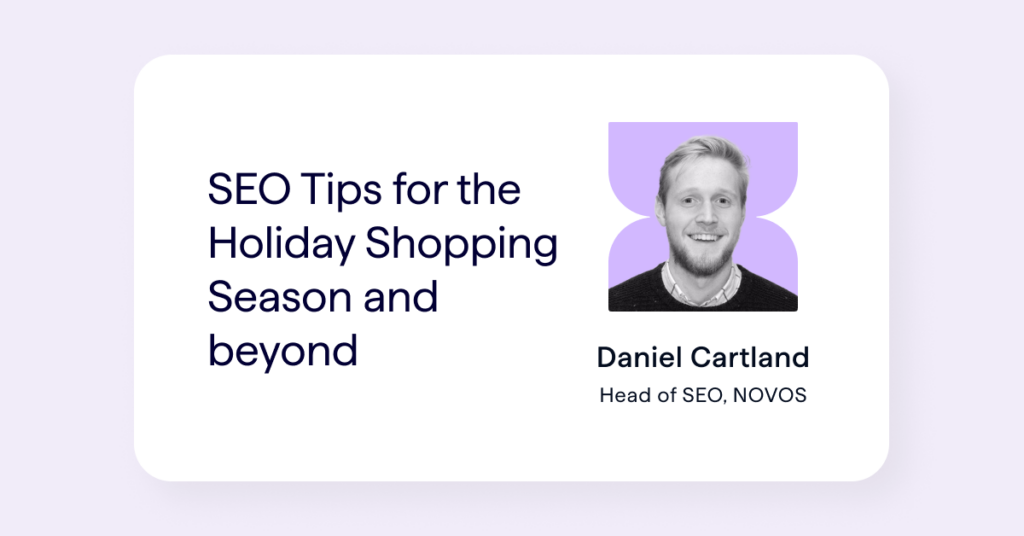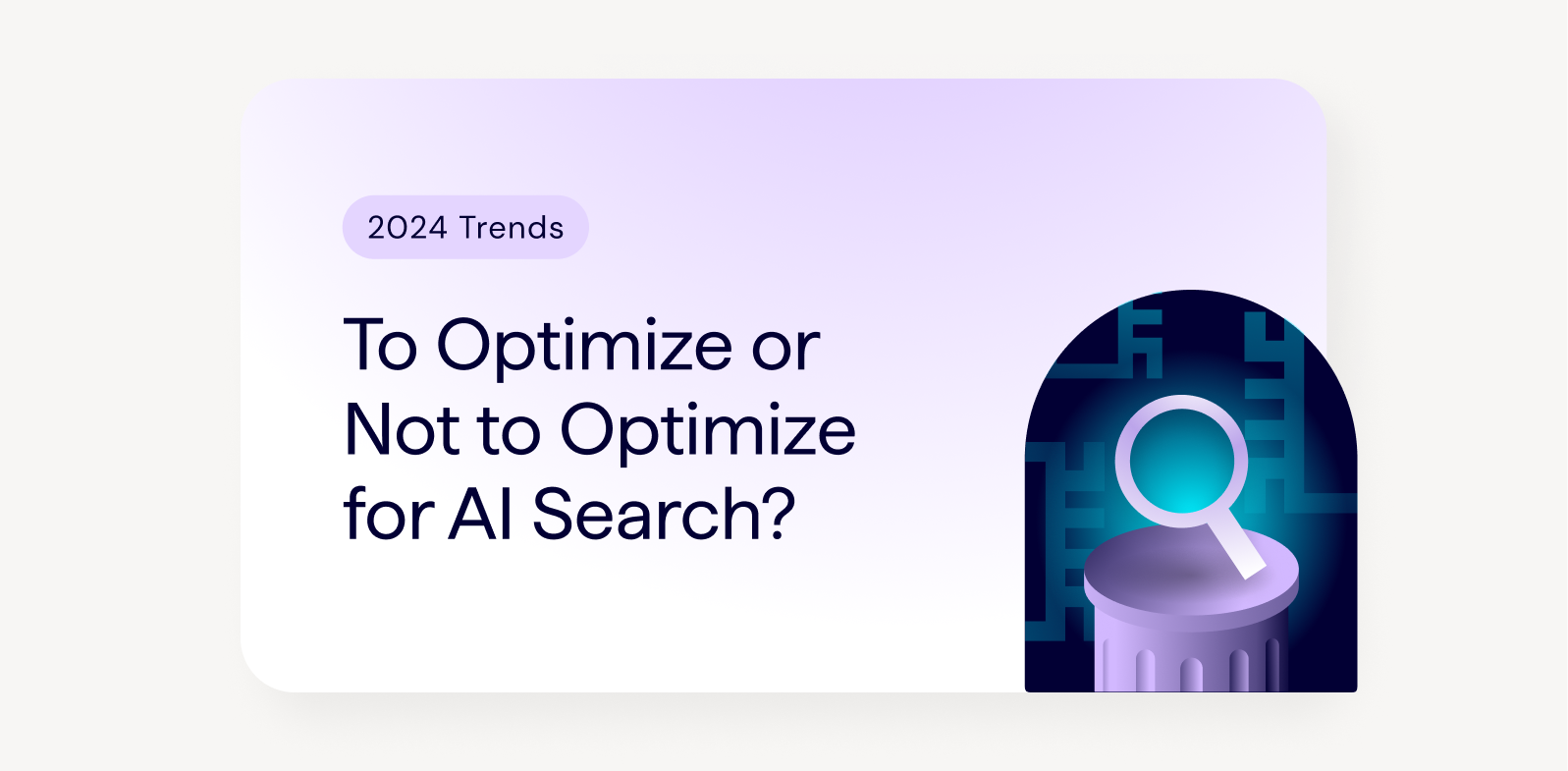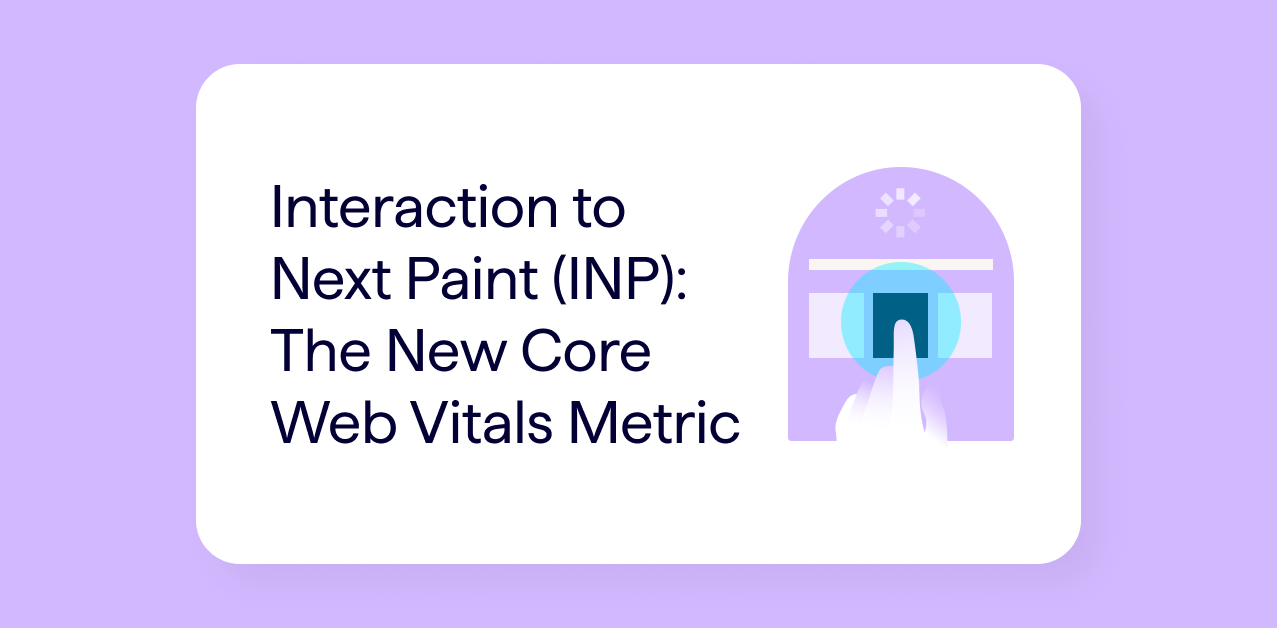—
Holidays are big business for offline and online businesses alike. But how do you ensure your eCommerce site is set up to fully take advantage of the surge in searches around seasonal holidays? We’ll run you through some key processes and ideas to optimize your eCom site for organic success around holiday events.
Create a holiday URL & keep it every year
Although it may seem obvious, perhaps the most crucial element in ranking competively for holiday-related keywords is having a URL that is specific to each holiday you want to target.
Crucially, this URL should not be dated, as the same URL should be re-used every year. This has the benefit of maintaining the value of the page from previous years, as well as having the URL already indexed and (hopefully!) ranking well for your relevant keywords. It’s also far easier to manage, as you don’t need to keep track of multiple old URLs, and you don’t have to worry about creating new pages every year and then redirecting/deleting them.
For example:
Good URL example — example.com/black-friday-deals
Bad URL example — example.com/black-friday-2019
Rather than starting from scratch every year to try to rank for holiday-related keywords, with a more ‘evergreen’ holiday URL, you’re all set to take advantage of holiday shopping traffic from the get go.
The pages created for holidays should be kept live all year round; they should not be redirected or removed to return a 404.
Optimize for how people search
Once these holiday pages are live, you’ll want to understand how people are searching for the products your site sells around the different holidays and ensure your pages are targeted towards these queries—and that your content provides the information that people are after.
For example:
- Christmas – gifts, delivery times
- Black Friday – deals, offers, discounts
- Mothers Day – gifts
Including the year in the targeting of page titles, h1s, and on-page copy (but not in the URL, as we discussed above) can also be beneficial for search, as often people use the current year when searching around holidays. Although we want to avoid the year in URLs, as the on-page optimization can be easily changed, this is not an issue and should in fact be beneficial to target & rank for relevant holiday keywords and align with how potential customers are searching around the holidays. However, you should be careful to make certain that you’re updating any and all references to dates in your copy each year!
Understand your markets
If you’re operating an eCommerce site in multiple locations, you also need to be conscious of key differences between your markets.
This will include product naming conventions day-to-day, but for seasonal holidays, it will often also mean different events throughout the year, different dates for similar holidays that are location-dependent, and different attitudes, traditions, and cultural approaches to major holidays.
For example:
- Both the US and the UK celebrate Mother’s Day, however, these land on different days (and different months) in the year.
- Australia often celebrates discounts in combination with Australia Day, while the US often offers holiday sales around the 4th of July.
- India sees a huge rise in commerce surrounding Diwali, whereas this is rarely reflected in the UK or US.
Supporting content for holiday campaigns
As with any transactional page, you will also need to consider how to support a holiday page with additional content.
As with the main holiday pages, the ideal scenario for supporting content is to create undated page URLs that can be updated every year, for example:
Good URL example — example.com/blog/best-black-friday-deals
Bad URL example — example.com/blog/best-black-friday-deals-2021
However, your wider marketing team may want to push out other promotional material that is specific for a given year, so it’s also worthwhile to have a plan in place for supporting content that may not be evergreen. This includes 301-redirecting dated marketing materials in the months after the holiday occurs to send users to evergreen pages. This has the benefit of maintaining the authority these content pages may have accrued without providing irrelevant or outdated information on your site in future years.
Ramp up internal linking in the lead-up to the holiday
You want to make sure your site is in the best position to rank competitively for the key holidays and crucially, in the build-up to these holidays.
Looking at the term “Black Friday” in Google Trends, we can see that searches for that term pick up about a month before the event itself. This means that we want to make sure that the internal optimizations we’re implementing occur at least a couple of weeks before the search trends pick up.
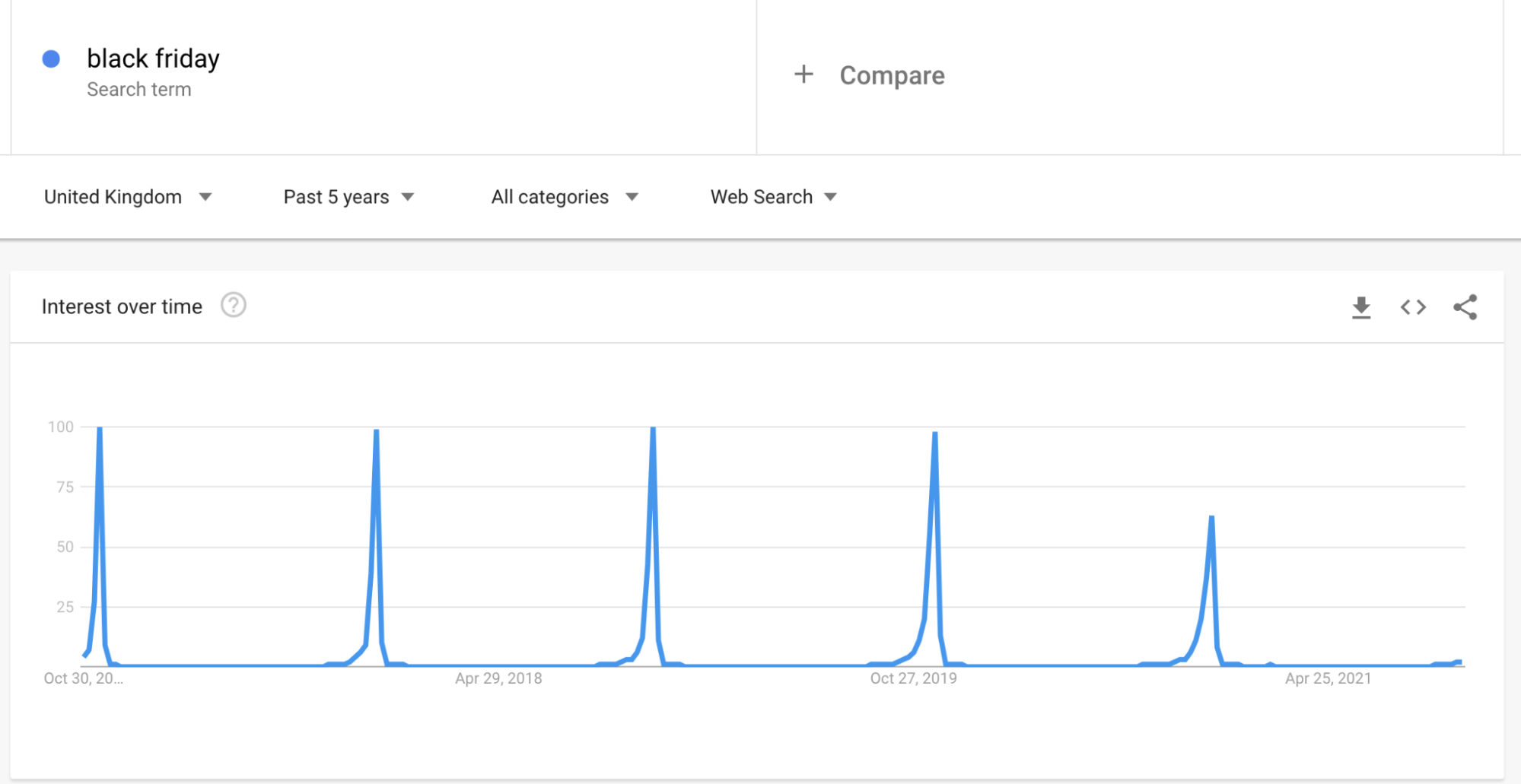
Internal linking is a crucial tactic to ensure your holiday pages are given a boost of internal authority in the lead-up and during holidays.
Add links to your main holiday pages from the homepage, clearly signaling importance for customers and search engines alike.
Add links to your global navigation.
Update old blog posts related to the holiday, making sure they internally link to your main holiday pages.
Publish new & relevant blog posts and include links to your main holiday category pages.
Once the holiday is over, you can remove the links to your holiday pages from the homepage and global navigation to ensure you’re not passing internal authority across unnecessarily out of season.
Utilize email captures out of season & link to core pages
With any holiday pages, we also want to make sure their full capacity is being taken advantage of, even after the event.
We recommend incorporating an email capture on major holiday pages when out of season—this gives you another method of contacting your customers when the holiday season begins and beyond.
In addition to email capture, it’s also worth considering adding links to other core categories on your site on out-of-season holiday pages. This will not only help pass the authority of your holiday pages through to other areas of the site, but it will also make it easy for a customer to continue their journey on another area of the site.
An example of using email capture on holiday pages when out of season:
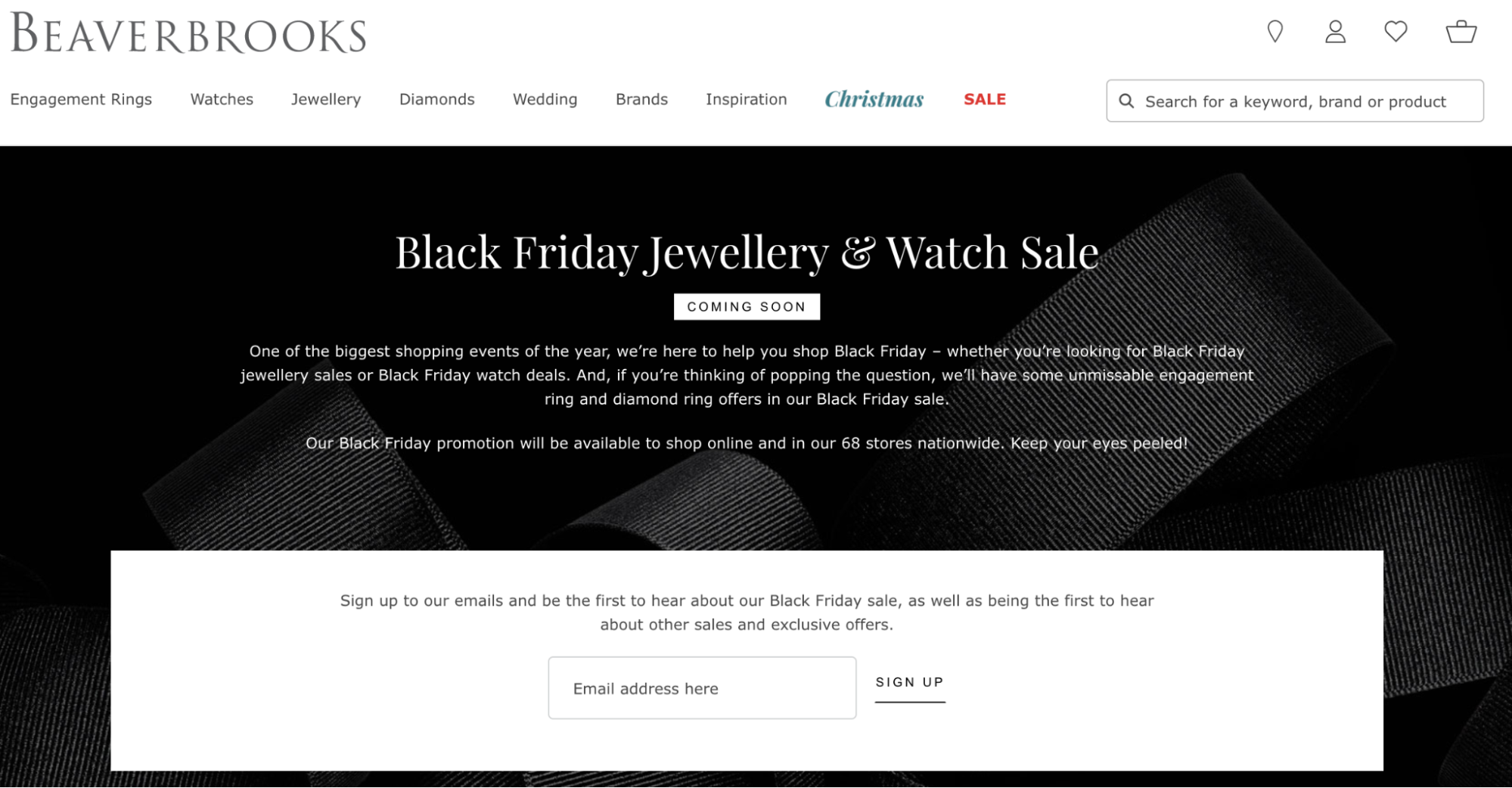
Anti-holiday marketing trends & other considerations
A trend that has become more popular in recent years is anti-holiday marketing, both for ethical and (potentially) marketing purposes for the more cynical among us.
Black Friday
The potentially unsustainable nature of Black Friday has led some brands to take a stance against the holiday. This comes in many different forms:
- Using a Black Friday page to promote sustainable practices rather than deals
- Raising prices instead of lowering them in protest
- Donating profits from the day to environmental charities
- Removing an online store or entire website on Black Friday (not recommended, from an SEO perspective)
Although most of these tactics actively aim to not target Black Friday as a holiday, they may support overall marketing and SEO in other ways, such as in the generation of media coverage and backlinks to a site, or the general promotion of a sustainable Unique Selling Point (USP) of a product & brand.
However, to preserve the SEO value of a site, if possible, we recommend not taking a site offline (returning a non-200 response code) due to the impact it can potentially have on search rankings.
Mothers/Father’s Day Considerations
Due to the sensitive and potentially triggering nature of Mother’s & Father’s Day marketing and emails, some brands now send a pre-emptive email to opt out of certain holiday marketing.
Although not strictly SEO-related, this kind of customer-centric approach to the holiday season can show support to your customers in the long run and could increase trust and empathy with your brand. Although not anti-marketing, in the same sense that some brands pursue anti-Black Friday activities, this type of sensitivity around key holiday events may be worth considering as you put together your full holiday marketing plans.
With these SEO and consumer considerations in mind, you should be ready to kick off your holiday season marketing with full force and ready to take full advantage of organic success year after year.
For more tips and tactics on SEO planning for holidays, check out Lumar’s eBook, “SEO strategies to get your site ready for Black Friday”.
